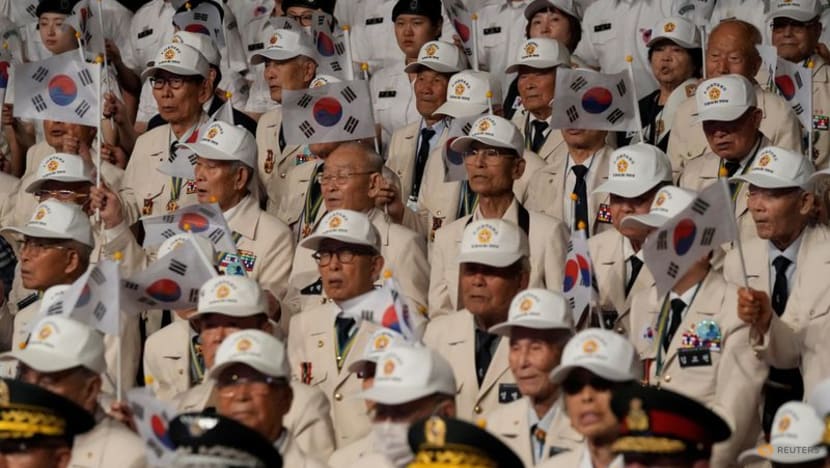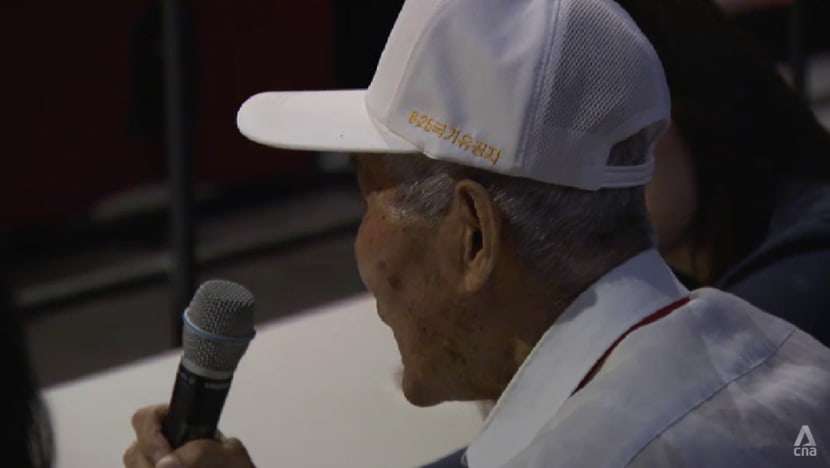‘They made us work day and night’: South Korean prisoner of war for over 50 years recalls life in the North
Tens of thousands of South Korean soldiers remain in captivity in North Korea.

Korean War veterans wave the national flags during a ceremony to mark the 74th anniversary of the outbreak of the Korean War in Daegu, South Korea, Tuesday, June 25, 2024. Ahn Young-joon/Pool via REUTERS

This audio is generated by an AI tool.
SEOUL: South Korean Kang Hee Yeol was just 18 when he joined the army in March 1951, following the start of the Korean War in 1950.
But about two months later, he was captured by the North Koreans.
“I could not go anywhere because they had full control over us and made us work day and night like an ox,” said the now 94-year-old, who is among the few South Korean prisoners of war who have managed to escape and made it home.
“I spent about 50 years like that, like being in prison but without a cage,” he added.
PLOTTING HIS OWN ESCAPE FROM NORTH KOREA
For decades, he worked at coal mines and farms while waiting to return home.
In June 2000, Mr Kang and his fellow prisoners of war thought their ordeal was almost over when they heard that leaders from both sides were meeting for the first inter-Korean summit since the war.
Then-South Korean president Kim Dae-jung flew to Pyongyang for talks with the North Korean leader Kim Jong Il.
But to the war prisoners’ dismay, their plight was set aside as the two leaders sought reconciliation.
“I was so sure he was also coming to get us back home, but there was not a word mentioned about us,” said Mr Kang, who lost hope that the South Korean government would save them.
“I think it was wrong. I realised then that if I were to die, I should go back to my hometown and die.”
With that in mind, he later plotted his own escape.
It was only in 2009, after crossing the Tumen River separating North Korea and China, that Mr Kang set foot in South Korea for the first time in 58 years.

THOUSANDS OF SOUTH KOREAN SOLDIERS REMAIN IN CAPTIVITY
While an armistice agreement was signed in July 1953 to end the conflict, a peace treaty never followed.
North Korea then sent around 8,000 South Korean soldiers home. It claims that all prisoners of war have been returned.
However, South Korea believes about 82,000 of its soldiers went missing in the North.
Only 80 South Korean prisoners of war have plotted their escape and returned home, with just nine still alive.
More than 250 families of war prisoners have also managed to flee the North. Among them is Ms Son Myeong-hwa, chairperson of the Korean War POW Family Association.
Her father was a South Korean soldier from Gimhae, about 18km away from Busan. He was captured and forced to work in coal mines and a logging factory for decades.
Ms Son told CNA that her father, who died of cancer in 1984, had earlier asked for his remains to be buried in South Korea.
Remembering his wish, she defected in 2005.
With the help of her siblings in North Korea and a broker, she later brought her father’s remains out of the North. He was finally buried at the Daejeon National Cemetery in 2015.
“Publicising my father's story caused my three siblings in North Korea to be sent to political prison camps,” said Ms Son.
“It felt like a tragic trade-off: Bringing my father's remains here at the cost of my living family members. I wanted to raise awareness of the war prisoners' human rights and their unaddressed suffering.”
FAMILIES STILL FIGHTING FOR SOLDIERS’ RECOGNITION
Ms Son still recalls her father sharing stories about his life in the South.
“He made me memorise his military number, K11, and warned me not to write it down because it could get me killed,” she said.
“So I kept it in my memory, along with the names of my grandparents and his address in his hometown, just in case I could visit if reunification happened.”
Recalling the inter-Korean summit in 2000, Ms Son said: “When South Korean president Kim Dae-jung went to North Korea, at that time, not every household had a TV.
“Our fathers, the prisoners of war, went to the houses that had TVs to watch the visit of the nation’s leader. The prisoners of war wondered if they would be mentioned, but there wasn’t a single word about them.”
She added that many families are still fighting for the prisoners of war to be recognised by the South Korean government for their service.
For now, those who never returned are marked as missing or assumed dead, and are not honoured as war heroes.
Mr Gordon Kang, senior analyst at the S Rajaratnam School of International Studies, said reunification - and allowing these South Koreans who are still in North Korea to return - is still a core national goal for South Korea.
But under current geopolitical circumstances, it is “difficult” to envision reconciliation happening in the near term, he told CNA’s East Asia Tonight on Tuesday (Jul 25).


















